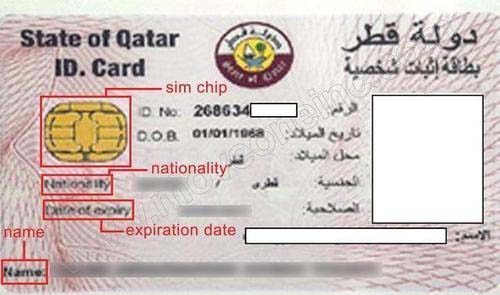
Qatar identity cards may soon include the residential addresses of their holders’, in an apparent bid to step up security in the state.
During its weekly meeting yesterday, the Cabinet approved a draft decision by the Interior Minister to determine the information on the ID cards for Qataris and expats, and the documents required to produce them, Qatar News Agency reports.
The news comes as the Ministry of Interior’s General Directorate of Nationality, Borders and Expatriate Affairs announced that during this week’s Milipol military expo in Doha, it signed a QR9.9 million contract with Itqan Technologies for smart ID cards.
Details of the deal have yet to be disclosed.

Almost all adult residents of Qatar are required to have ID cards. They do not legally have to carry the ID with them at all times.
However, failure to produce an ID card when demanded by a law enforcement official (not necessarily on the spot) could lead to a fine of up to QR10,000.
Nevertheless, most residents frequently carry their ID cards with them, as they are often required to produce them to gain access to residential compounds, apartment blocks and some clubs.
MOI also undertakes periodic spot-checks around town, stopping cars and asking residents to show their ID cards.
Card details
Most residents are currently issued traditional ID cards, “smart” cards are also now available. These cards, which feature biometric data such as fingerprints and eye scans on an embedded electronic chip used to verify the cardholder’s’ identity, were introduced in 2011.
Smart cards can be obtained when residents register for e-gate – which fast-tracks them through passport control queues at Hamad International Airport.
According to the Peninsula, the idea to put home addresses on ID cards is one way Qatar hopes to improve internal state security, by making it easier for authorities to track down residents.
The newspaper added that all residents are already required by law to inform police of their most up-to-date postal and home addresses – although this is not strictly enforced.
“But from the interior ministry’s draft decision approved by the Cabinet yesterday it is obvious that it is now going to enforce the law quite seriously,” the Peninsula quotes local lawyer Mohsin Thiyab Al Suwaidi as saying.
Al Suwaidi added that the presence of addresses on ID cards would assist courts in summoning an individual relating to a legal case.
Including home address details on an official card is not unusual internationally, with many countries such as the US, Canada and the UK requiring this information on drivers’ licenses.
But the potential move raises questions about personal security. For example, if an ID card is lost or stolen, the holder’s home would be easy to find.
Also, as many expats move frequently, it could put a considerable administrative burden on the individual to inform authorities of the change, and also the ministry to issue new ID cards.
Address system
Al Suwaidi also cited safety reasons for including the physical address on ID cards, saying it would help many people who do not know how to describe to first responders where they live in the event of an emergency.
Qatar’s lack of a formal street name and house numbering system can lead to confusion about the precise location of a particular address.
The Ministry of Municipality and Urban Planning has been trying to tackle this problem by posting blue address plaques outside commercial, residential and public properties.
These list the building, zone and street numbers and serve as public addresses.
They can be used to navigate the country via an online service that helps residents locate places based on the information listed on the plates.
Thoughts?








